- Faculty
Faculty of Engineering and Technology
- Department
Aerospace and Automotive Engineering
- Campus
Technology Campus (Peenya Campus)
- Engagement Mode
Full Time
- Study
4 Years
Overview
According to The Business Research Company, the Aerospace Market is projected to experience substantial growth, increasing from $298.0 billion in 2020 to $430.9 billion by 2025 at a growth rate of 7.7%. Furthermore, the global aerospace market is anticipated to sustain this expansion, achieving a Compound Annual Growth Rate (CAGR) of 5.9% from 2025 onwards, with a target of $573.6 billion by 2030.
This promising forecast strongly underscores the increasing need for skilled professionals in the aerospace industry, particularly those with a B.Tech in Aerospace Engineering. In India, numerous government organizations, including DRDO, the Aeronautical Development Agency (ADA), the Council for Scientific and Industrial Research (CSIR), and Hindustan Aeronautics Limited (HAL), along with private enterprises such as Boeing, Airbus, General Electric, Pratt and Whitney, SNECMA, Honeywell, and Goodrich Aerospace, actively seek individuals who can drive innovation and transformation.
The B. Tech. in Aerospace Engineering plays a pivotal role in bridging the talent gap in these renowned organizations and others worldwide. The B.Tech in aerospace engineering syllabus equips professionals with the skills and knowledge required to meet the evolving demands of the aerospace engineering sector, ensuring a steady supply of capable experts for the industry's future.
Program Objectives
- A renowned establishment with a 62-year history
- Accredited with NAAC A+ and ranked by NIRF
- Faculty consisting of experts from prestigious institutions like IITs, IIMs, and more
- Outstanding placement records, including the highest domestic package reaching Rs 45 LPA
- Partnerships established with leading global universities such as MIT, University of Illinois, among others
- State-of-the-art facilities including Advanced Learning Centre, Techno Center, NABL accredited Labs, Incubation Centre, etc.
Program Educational Objectives
- To Provide students with knowledge in mathematics, Science and Core engineering area to enable them to deliver efficient solutions for complex engineering problems using analytical and cognitive skills.
- To enable students to design and develop the sustainable innovative solution for industry and societal requirements by conducting engineering investigations through experimentation and usage of modern tools.
- To inculcate ethics, communication, leadership, soft, managerial and entrepreneurial skills for successful career in industries and to engage in lifelong learning.
Curriculum Details
2023-27
| Sl. No. | Code | Course Title | Theory (h/W/S) | Tutorials (h/W/S) | Practical (h/W/S) | Total Credits | Max. Marks |
|---|---|---|---|---|---|---|---|
| 1 | MTB101A | Engineering Mathematics-1 | 3 | 1 | 0 | 4 | 100 |
| 2 | PYB102A | Engineering Physics and Laboratory | 3 | 0 | 2 | 4 | 100 |
| 3 | CEF101A | Engineering Mechanics | 3 | 0 | 0 | 3 | 100 |
| 4 | ECF102A | Elements of Electronics Engineering and Laboratory | 3 | 0 | 2 | 4 | 100 |
| 5 | MEF103A | Engineering Drawing | 2 | 0 | 2 | 3 | 100 |
| 6 | LAN101A | Constitution, Human Rights and Law | 2 | 0 | 0 | 2 | 50 |
| Total | 16 | 1 | 6 | 20 | 550 | ||
| Total number of contact hours per week | 23 | ||||||
| Sl. No. | Code | Course Title | Theory (h/W/S) | Tutorials (h/W/S) | Practical (h/W/S) | Total Credits | Max. Marks |
| 1 | MTB101A | Engineering Mathematics - 1 | 3 | 1 | 0 | 4 | 100 |
| 2 | CYB104A | Engineering Chemistry and Laboratory | 3 | 0 | 2 | 4 | 100 |
| 3 | MEF104A | Elements of Mechanical Engineering and Work shop Practice | 2 | 0 | 2 | 3 | 100 |
| 4 | EEF105A | Elements of Electrical Engineering and Laboratory | 3 | 0 | 2 | 4 | 100 |
| 5 | CSF106A | Elements of Computer Science and Engineering and Laboratory | 3 | 0 | 2 | 4 | 100 |
| 6 | TSN101A | Professional Communication | 2 | 0 | 0 | 2 | 50 |
| Total | 16 | 1 | 8 | 21 | 550 | ||
| Total number of contact hours per week | 25 | ||||||
| Sl. No. | Code | Course Title | Theory (h/W/S) | Tutorials (h/W/S) | Practical (h/W/S) | Total Credits | Max. Marks |
|---|---|---|---|---|---|---|---|
| 1 | MTB102A | Engineering Mathematics-2 | 3 | 1 | 0 | 4 | 100 |
| 2 | PYB102A | Engineering Physics and Laboratory | 3 | 0 | 2 | 4 | 100 |
| 3 | CEF101A | Engineering Mechanics | 3 | 0 | 0 | 3 | 100 |
| 4 | ECF102A | Elements of Electronics Engineering and Laboratory | 3 | 0 | 2 | 4 | 100 |
| 5 | MEF103A | Engineering Drawing | 2 | 0 | 2 | 3 | 100 |
| 6 | LAN101A | Constitution, Human Rights and Law | 2 | 0 | 0 | 2 | 50 |
| Total | 16 | 1 | 6 | 20 | 550 | ||
| Total number of contact hours per week | 23 | ||||||
| Sl. No. | Code | Course Title | Theory (h/W/S) | Tutorials (h/W/S) | Practical (h/W/S) | Total Credits | Max. Marks |
|---|---|---|---|---|---|---|---|
| 1 | MTB102A | Engineering Mathematics - 2 | 3 | 1 | 0 | 4 | 100 |
| 2 | CYB104A | Engineering Chemistry and Laboratory | 3 | 0 | 2 | 4 | 100 |
| 3 | MEF104A | Elements of Mechanical Engineering and Work shop Practice | 2 | 0 | 2 | 3 | 100 |
| 4 | EEF105A | Elements of Electrical Engineering and Laboratory | 3 | 0 | 2 | 4 | 100 |
| 5 | CSF106A | Elements of Computer Science and Engineering and Laboratory | 3 | 0 | 2 | 4 | 100 |
| 6 | TSN101A | Professional Communication | 2 | 0 | 0 | 2 | 50 |
| Total | 16 | 1 | 8 | 21 | 550 | ||
| Total number of contact hours per week | 25 | ||||||
| Sl. No. | Code | Course Title | Theory (h/W/S) | Tutorials (h/W/S) | Practical (h/W/S) | Total Credits | Max. Marks |
|---|---|---|---|---|---|---|---|
| 1 | MTF201A | Engineering Mathematics - 3 | 3 | 1 | 0 | 4 | 100 |
| 2 | ASD202A | Materials Science for Engineers | 3 | 0 | 0 | 3 | 100 |
| 3 | ASC203A | Elements of Aerospace Engineering | 3 | 0 | 0 | 3 | 100 |
| 4 | ASD204A | Thermodynamics for Engineers | 3 | 1 | 0 | 4 | 100 |
| 5 | ASD205A | Fluid Mechanics and Machines | 3 | 1 | 0 | 4 | 100 |
| 6 | ASL206A | Aeromodelling Laboratory | 0 | 0 | 2 | 1 | 50 |
| 7 | ASL207A | Fluid Mechanics and Machines Laboratory | 0 | 0 | 2 | 1 | 50 |
| 8 | BTN101A | Environmental Studies | 2 | 0 | 0 | 2 | 50 |
| Total | 17 | 3 | 4 | 22 | 650 | ||
| Total number of contact hours per week | 24 | ||||||
| Sl. No. | Code | Course Title | Theory (h/W/S) | Tutorials (h/W/S) | Practical (h/W/S) | Total Credits | Max. Marks |
|---|---|---|---|---|---|---|---|
| 1 | MTF202A | Engineering Mathematics - 4 | 3 | 1 | 0 | 4 | 100 |
| 2 | ASD212A | Strength of Materials | 3 | 1 | 0 | 4 | 100 |
| 3 | ASC213A | Manufacturing Processes for Aerospace Systems | 4 | 0 | 0 | 4 | 100 |
| 4 | ASD214A | 3D Modeling and Machine Drawing | 1 | 0 | 4 | 3 | 100 |
| 5 | ASC215A | Aeordynamics-1 | 3 | 0 | 0 | 3 | 100 |
| 6 | ASL216A | Materials and Testing Laboratory | 0 | 0 | 2 | 1 | 50 |
| 7 | ASL217A | Manufacturing Processes Laboratory | 0 | 0 | 2 | 1 | 50 |
| 8 | ASL218A | Aerodynamics Laboratory | 0 | 0 | 2 | 1 | 50 |
| 9 | BAU201A | Innovation and Entrepreneurship | 3 | 0 | 0 | 3 | 100 |
| Total | 17 | 2 | 10 | 24 | 750 | ||
| Total number of contact hours per week | 29 | ||||||
| Sl. No. | Code | Course Title | Theory (h/W/S) | Tutorials (h/W/S) | Practical (h/W/S) | Total Credits | Max. Marks |
|---|---|---|---|---|---|---|---|
| 1 | ASC301A | Aerospace Structures | 3 | 1 | 0 | 4 | 100 |
| 2 | ASD302A | Theory of Machines and Mechanisms | 3 | 1 | 0 | 4 | 100 |
| 3 | ASC303A | Aerodynamics -2 | 3 | 0 | 0 | 3 | 100 |
| 4 | ASC304A | Aerospace Propulsion-1 | 3 | 1 | 0 | 4 | 100 |
| 5 | ASD305A | Artificial Intelligence and Machine Learning | 3 | 1 | 0 | 4 | 100 |
| 6 | ASD306A | Control System Engineering and Laboratory | 3 | 0 | 2 | 4 | 100 |
| 7 | ASL307A | Aerospace Structures Laboratory | 0 | 0 | 2 | 1 | 50 |
| 8 | ASL308A | Aerospace Propulsion Laboratory | 0 | 0 | 2 | 1 | 50 |
| Total | 21 | 4 | 6 | 25 | 700 | ||
| Total number of contact hours per week | 31 | ||||||
| Sl. No. | Code | Course Title | Theory (h/W/S) | Tutorials (h/W/S) | Practical (h/W/S) | Total Credits | Max. Marks |
|---|---|---|---|---|---|---|---|
| 1 | ASC311A | Aerospace Propulsion -2 | 3 | 1 | 0 | 4 | 100 |
| 2 | ASD312A | Finite Element Analysis | 3 | 1 | 0 | 4 | 100 |
| 3 | ASC313A | Aircraft Performance, Stability and control | 4 | 0 | 0 | 4 | 100 |
| 4 | ASC314A | Computational Fluid Dynamics | 4 | 0 | 0 | 4 | 100 |
| 5 | ASD315A | Engineering Economics | 3 | 0 | 0 | 3 | 100 |
| 6 | ASL316A | CFD Laboratory | 0 | 0 | 2 | 1 | 50 |
| 7 | ASL317A | CAE Practices for Aerospace Application | 0 | 0 | 2 | 1 | 50 |
| 8 | ASS311A | Seminar | 0 | 0 | 2 | 1 | 50 |
| 9 | ASE31XA | Professional Core Elective - 1 | 4 | 0 | 0 | 4 | 100 |
| Total | 21 | 2 | 6 | 26 | 650 | ||
| Total number of contact hours per week | 29 hours | ||||||
| Sl. No. | Code | Course Title | Theory (h/W/S) | Tutorials (h/W/S) | Practical (h/W/S) | Total Credits | Max. Marks |
|---|---|---|---|---|---|---|---|
| 1 | ASE41XA | Professional Core Elective - 2 | 4 | 0 | 0 | 4 | 100 |
| 2 | ASE42XA | Professional Core Elective - 3 | 4 | 0 | 0 | 4 | 100 |
| 3 | OEE41XA | Open Elective - 1 | 3 | 0 | 0 | 3 | 100 |
| 4 | ASP401A ASI401A | I] Project Work - 1 II]Internship (Choose one) | 0 | 0 | 12 | 6 | 200 |
| Total | 11 | 0 | 12 | 17 | 500 | ||
| Total Number of Contact Hours per week | 23 | ||||||
| Sl. No. | Code | Course Title | Theory (h/W/S) | Tutorials (h/W/S) | Practical (h/W/S) | Total Credits | Max. Marks |
|---|---|---|---|---|---|---|---|
| 1 | ASP402A | Project Work - 2 | 0 | 0 | 24 | 12 | 300 |
| Total | 0 | 0 | 24 | 12 | 300 | ||
| Total Number of Contact Hours per week | 24 | ||||||
| Stream Group | Aerospace Vehicles | Aircraft Structures | Aerospace Materials | Data Sciences and Analytics | Applied Mathematics | |
|---|---|---|---|---|---|---|
| PCE-1 | Course Code | ASE311A | ASE312A | ASE313A/MEE314A | MTE301A | MTE302A |
| Sem. 6 | Course Title | Hypersonic Flow | Composite Structures | Light Weight and Novel Materials/ Additive Manufacturing | Probability and Statistics | Advanced Mathematics |
| PCE-2 | Course Code | ASE411A | ASE412A | ASE413A | CSE411A | MTE401A |
| Sem. 7 | Course Title | Unmanned Air Vehicles | Aerospace Structural Dynamics | Surface Engineering | Data Sciences and Foundation | Optimization Techniques -1 |
| PCE-3 | Course Code | ASE421A | ASE422A | ASE423A | CSE431A | MTE403A/ MTE402A |
| Sem.7 | Course Title | Conceptual Design of Aircraft | Fatigue and Fracture Mechanics | Testing Techniques for Aerospace Systems | Data Analytics | Advanced Numerical Methods/ Optimization Techniques -2 |
Note:
Students are required to select one Professional Core Elective Courses in the 6th Semester, one each from PCE-1 Group.
Students are required to select two Professional Core Elective course in the 7th Semester from the PCE-2 and PCE-3 Groups.
Open Elective Courses
A number of Open Elective Courses from various Faculties of RUAS are offered as mentioned in the University’s website. Students can choose the Open Electives of their choice. The students are permitted to choose online electives from the list approved by the respective HoD and Dean.
Eligibility Criteria
Candidates must have passed 10+2 examination with Physics and Mathematics as compulsory courses, along with Chemistry, Biology, Electronics, and Computer Science.
Candidates from the general category must have obtained at least 45% aggregate marks.
Candidates from the reserved category must have obtained at least 40% aggregate marks
The Equivalence Committee’s decision in the cases of lateral entry candidates will be final.
General category candidates must have passed a diploma examination from an approved institution with a minimum of 45% marks.
General category candidates must have passed a B.Sc. from a University recognised by UGC with a minimum of 45% marks.
Reserved category candidates must have passed with a minimum of 40% marks and passed 12th standard with Physics and Mathematics as courses.
Structure
Fee Structure 2025–26
| Total Fee Per Year |
|---|
| 350,000 |
Intake
60 Seats
Career Path
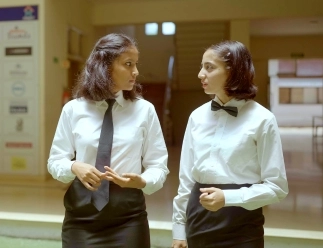
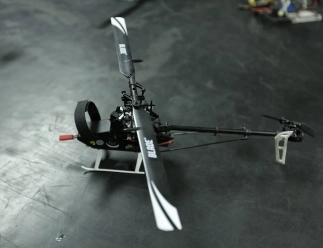
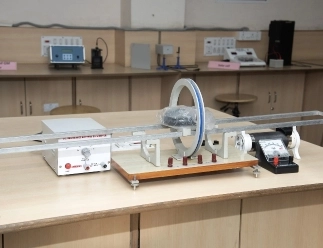
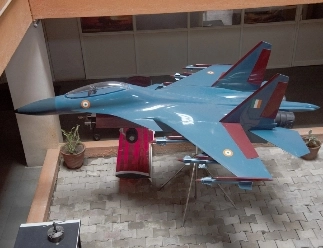
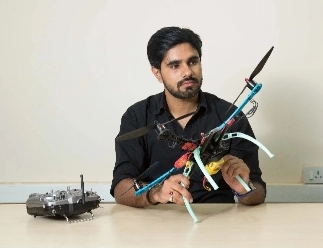


FAQs
Yes, it is a promising field. The global aerospace market is growing rapidly and leading companies like Boeing, Airbus and DRDO actively seek skilled aerospace engineers, making this degree a valuable pathway for career opportunities and innovation in the aviation and space sectors.
It is a four-year undergraduate programme that prepares students for complex aerospace challenges. It covers aircraft design, propulsion, aerodynamics, structures and materials while focusing on modern engineering tools and sustainability. The programme also builds leadership, entrepreneurial and ethical skills.
Candidates must have passed 10+2 with Physics and Mathematics as compulsory subjects. A minimum of 45% marks is required for the general category and 40% for the reserved categories. Lateral entry and B.Sc. holders must also meet these respective percentage criteria.
RUAS offers advanced facilities like NABL-accredited labs, incubation centres, aero-modelling labs, propulsion labs and strong industry collaborations. Students also benefit from faculty with IIT and IIM backgrounds and access to international partnerships with institutions like MIT.
Graduates can work as Aerospace Engineers, Aircraft Design Engineers, Flight Test Engineers, Avionics Engineers, R&D Engineers and Maintenance Engineers. Opportunities exist in both government organisations like DRDO and HAL and private firms such as Boeing and Honeywell.
Aerospace engineering graduates can become pilots by undergoing separate flight training and obtaining the required pilot licenses. The degree provides a strong technical foundation for aviation careers.
Yes, considering the robust curriculum, high placement records (up to ₹45 LPA), global collaborations and the growing aerospace market, a degree from RUAS offers substantial value, both academically and professionally, for students passionate about aviation and space technology.
The total fee per year for the B.Tech in Aerospace Engineering programme at RUAS is ₹3,50,000. This includes tuition, lab access and university facilities. Scholarships may also be available through university, state, central, or private schemes.
Testimonial
Contact
Start your journey with MSRUAS
Department of Aerospace and Automotive Engineering.
Contact
Phone +91 80-4906 5555
Email hod.aae.et@msruas.ac.in


